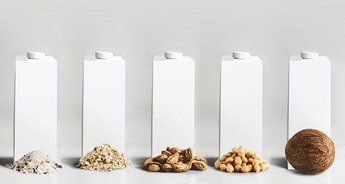Plant-based non-dairy drinks: nutritional content and health profile

01.2023
Author Dr. J. Hower, paediatrician from Germany
Children are increasingly given plant-based alternatives to cow’s milk. Why is this problematic and what health consequences are to be expected?
Plant-based milk substitutes are predominantly made from four plant foods: soy, oats, almonds and peas. However, most milk alternatives are nutritionally unbalanced compared to cow’s milk. Switching from cow’s milk to plant-based alternatives can therefore lead to short-term and long-term health consequences.
What have studies found and what is recommended?
Studies show that cow’s milk, with its complex ingredients, significantly contributes to many areas in early childhood and adolescence, among others:
- Linear growth
- Vitamin D status
- Bone health
The current plant-based drinks cannot sufficiently cover infants’ needs related to those areas. The likelihood of physical harm to infants given nutritionally inadequate milk substitutes is high and much greater than for toddlers.
Reason: In infants, a higher percentage of the nutrient requirement must be covered by human milk or infant formula (adapted cow’s milk). In Europe, the composition of infant formulae is highly regulated by law.
- Cow’s milk plays an important role in the protein intake of young children. It is not only a question of quantity, but also of quality. Plant-based non-dairy drinks have a lower protein content and quality.
- Soy-based drink, which is the closest to cow’s milk, is no longer recommended in the first year of life due to the high allergy risk. Infants and children who are intolerant to cow’s milk protein can develop enterocolitis (inflammation of the small and large intestine) when given soy-based drinks, which has also been reported for other plant-based drinks.
Deficiencies caused by plant-based drinks and their consequences
Using plant-based milk substitutes that are unsuitable for infants and toddlers has a negative effect on their growth and development:
- Risk for nutrient deficiency diseases: Studies show an association of soy-based drinks with rickets (calcium and vitamin D deficiency, weakening of bone substance), rice-based drinks with kwashiorkor (protein-energy malnutrition) and almond-based drinks with rickets and scurvy (vitamin C deficiency disease).
- For the most part, plant-based milk substitutes could not meet the nutritional needs (esp. protein need) of infants and toddlers. Nutritional deficiencies can also occur in older children and adolescents, especially if there are other food restrictions and cow’s milk is omitted altogether.
- There are reports of hyperoxaluria (increased levels of oxalic acid in the urine) due to almond-based drink consumption leading to kidney stones as well as reports of vitamin A deficiency due to selective eating leading to blindness.
Avoiding a wide range of foods increases the health risk in all age groups, but especially in children with protein allergies.
References
Merrit RJ et al. North American Society for Pediatric Gastroenterology, Hepatology, and Nutrition Position Paper: Plant-based Milks. J Pediatr Gastroenterol Nutr 2020 Aug; 71(2):276–281.
Van Vliet et al. The Skeletal Muscle Anabolic Response to Plant- versus Animal-Based Protein Consumption. J Nutr 2015 Sep; 145(9): 1981–1991.
Bridges M. Moo-ove over cow’s milk. The rise of plant-based dairy alternatives. Pract Gastroenterol 2018: 20–7.
McCarthy KS et al. Drivers of choice for fluid milk versus plant-based alternatives: what are consumer perceptions of fluid milk? J Dairy Sci 2017; 100:6125–38.
Vitoria I. The nutritional limitations of plant-based beverages in infancy and childhood. Nutr Hosp 2017; 34:1205–14.
Wiley AS. Consumption of milk, but not other dairy products, is associated with height among US preschool children in NHANES 1999-2002. Ann Hum Biol 2009; 36:125–38.


